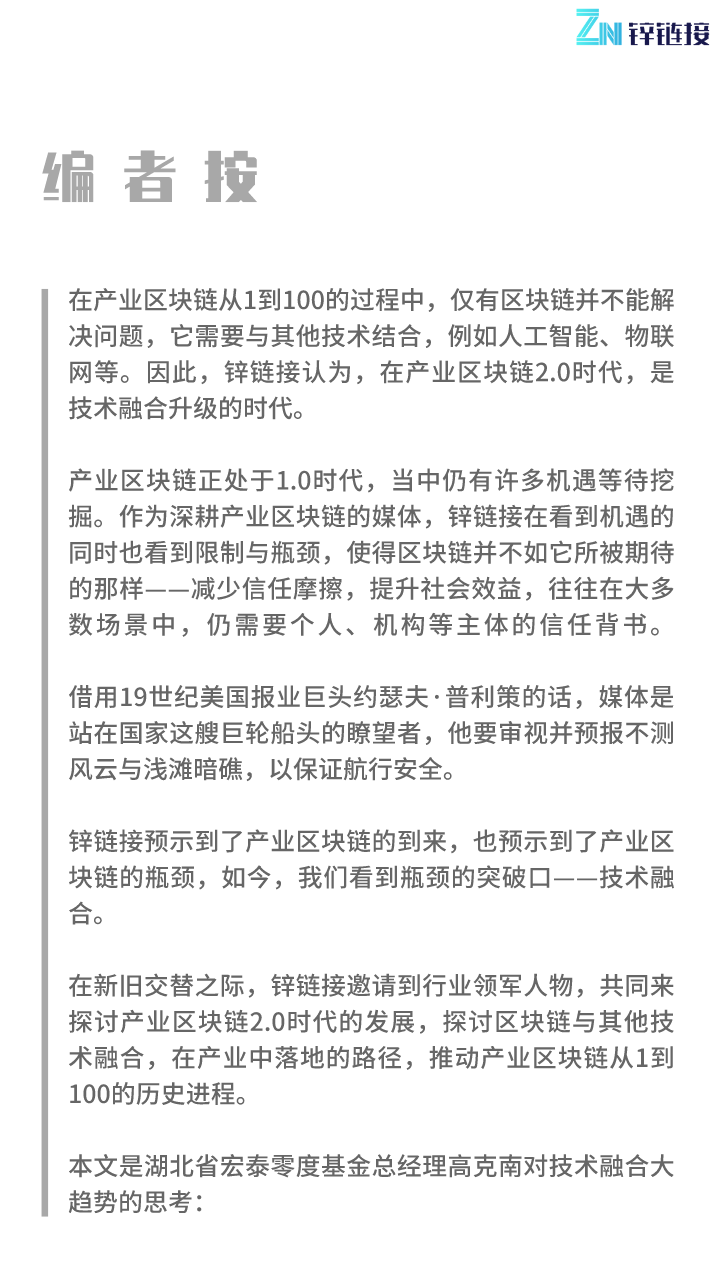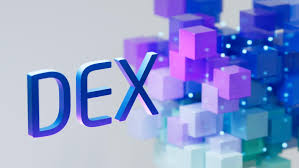Blockchain combines AI and sensors to open the era of intelligent industry
Text / Goknan
Editor / Wang Qiao
This article first appeared on WeChat public account zinc link (ID: xinlianjie-), pay attention to the public account, and explore the value of the industrial blockchain with us. If you need to reprint the article, please apply for whitelist on WeChat
 In 2019, China's GDP reached 99.1 trillion yuan, with per capita GDP exceeding US $ 10,000. The second largest economy, industrial GDP accounts for 39%. With the advent of the industrial Internet and the era of intelligent manufacturing, industrial upgrades will meet the needs of the consumer market The variety of products and quality requirements are of vital importance, and are the key to promoting the adjustment of the country's industrial structure.
In 2019, China's GDP reached 99.1 trillion yuan, with per capita GDP exceeding US $ 10,000. The second largest economy, industrial GDP accounts for 39%. With the advent of the industrial Internet and the era of intelligent manufacturing, industrial upgrades will meet the needs of the consumer market The variety of products and quality requirements are of vital importance, and are the key to promoting the adjustment of the country's industrial structure.
- CME Managing Director: CME Group Bitcoin Futures Trading Volume Reaches $ 100 Billion Since 2017
- The restless January finally passed, BSV rose 182% to lead the crypto market
- Thin application: comprehensive upgrade of the "fat protocol" of blockchain value capture theory
At the same time, with the emergence of global trade frictions in the past two years, the essence is to focus on the reconstruction of the manufacturing industry chain and production resources, further illustrating the importance and urgency of manufacturing upgrading for strong national strength, prosperity and stability.
In the eighteenth collective study of the Political Bureau of the People's Republic of China in 2019, the blockchain was identified as an important breakthrough in independent innovation of core technologies. Innovation.
With the rapid arrival of the era of globalization, the effectiveness of cross-company and regional cooperation will be the core competence of enterprises in the future . With the help of blockchain technology, enterprises can quickly access global manufacturing networks and provide more convenient, The intelligent and secure production and delivery process can use multi-party data for tracking, tracing, and interaction in the absence of trust, and promote the machine to complete self-management, transactions, and upgrades. In cooperation with sensors and the Internet of Things technology, the era of intelligent industry is fully opened.

The application of blockchain technology in the manufacturing industry includes the following scenarios:
- QC
Blockchain can effectively improve the manufacturer's quality control system, significantly reduce product recall costs, and reduce the risk of opaque information. Blockchain technology can monitor every step of the process from birth certificate to finished product. Data records are complete and difficult to modify, and can identify the authenticity and compatibility of goods, greatly improving the transparency of the manufacturing process. Eliminate inferior counterfeiting.
It is particularly important for food consumption, medical and pharmaceutical, aerospace and other precision manufacturing. For example, the procurement of aircraft parts includes hundreds of thousands to millions of parts. Existing sensor technology and information tools cannot achieve unified management and equipment data. The status is basically isolated between different manufacturers, and through the access of blockchain technology, cross-company data collection can be achieved, and continuous supervision and management can be implemented, and different levels of data sources can be opened through identity verification and protocols, effectively improving the production efficiency of aircraft manufacturers. And security.
- Maintenance management
Controlling maintenance costs is one of the important goals of future factories. Maintenance includes both normal and accidental maintenance. The latter causes huge cost losses and reputational impact on enterprises. At present, more and more maintenance in the market is provided by outsourcing to third parties. Further added complexity.
The introduction of blockchain technology can greatly improve maintenance efficiency, record all device service agreements, installation documents, etc. on the block, combine sensors, IoT technology, and build a digital management platform for the plant. Important parameters for the device, such as location and temperature , Status, identification, monitoring, and confidentiality and selective sharing of information among hardware, software vendors, and service providers in an agreed manner, which can clearly identify the time sequence of events, record various types of information, and facilitate the determination of problem rights and responsibilities. solution. In the case of a preset situation, the machine can automatically contact the upstream and downstream to complete the purchase or service.
- R & D support
The blockchain has an uninterrupted record of the entire manufacturing process, which can provide complete and true valuable operating data for use by the R & D department, and can be shared with R & D cooperation institutions and manufacturers with different permissions in a targeted manner, thereby continuously optimizing the production process and shortening R & D and delivery cycles to effectively integrate global resources.
- Efficiency optimization
The manufacturing industry usually accounts for a lot of money, and the rules of the game are formulated by the giants, which has caused an imbalance in the allocation of industry resources and inefficient use of funds. Through the identification and storage of blockchain technology and digital assets, the confirmation and payment cycle of digital assets can be shortened, and production efficiency can be improved. The convenient features of blockchain financial transactions combined with smart contracts can allow funds to be completed at high speed between different partners. This will redefine the need for deposits and balances, and ultimately ensure high-speed circulation of funds and goods, and design recovery clauses to prevent risks.
- fair competition
Small and medium-sized enterprises face a harsh competitive environment in the market, usually only capable of completing product technology research and development, lacking funds, energy and team in marketing and access. Blockchain technology can automatically match buyers and sellers through smart contracts and asset identification , To complete the delivery of goods and funds, promote effective competition in the market, reduce the gray area of human intervention factors and benefits transmission, and optimize the market competition pattern.
- IP protection
3D printing is a key component of the future manufacturing industry. In addition to the technical and cost issues of the industry, the inadequacy of IP protection is a pain point for the rapid development of the industry. Through blockchain technology, IP rights can be effectively protected, and model drawings are provided. While the customer is using it, through the permission setting, the production system can only unlock the encrypted model for production. It cannot peek into the mystery and unlimited use. At the same time, the win-win cooperation achieves the protection of IP. Reduce patent theft and innovation suppression.
- Safe manufacturing
In the future manufacturing industry, user data and production and use of dangerous goods need to be strictly controlled. The blockchain can effectively prevent the leakage and use of important information such as user data and design solutions of manufacturers through identity authentication technology. For the production of dangerous goods, it is possible to assess the manufacturer's identity and qualifications, set inspection rights, restrict production categories, strictly control the possibility of inflow and manufacture of dangerous goods production processes and materials to unauthorized organizations, and digital assets. Follow up, punish and dispose of manufacturers that violate production and illegal use.
At present, the application of blockchain technology in manufacturing still has problems of unclear IT systems and return on investment. However, with the continuous exploration and attempts of the industry and the encouragement and support of the country, we will certainly usher in a comprehensive opportunity of the times. . Faced with an unlimited global market, complex trading links, and unknown partners, blockchain technology will become the underlying technology for enterprises to participate in globalized markets.
In the end, the era of machine management machines will come. Machines will manage themselves according to settings, independently produce and trade, automatically update and upgrade, and automatically order accessories. In the future, companies that can connect, identify, monitor, and optimize global supply chains will have the opportunity to reclassify global resources, and blockchain technology will give first-mover advantages that are even more difficult to replace beyond the Internet era.
We will continue to update Blocking; if you have any questions or suggestions, please contact us!
Was this article helpful?
93 out of 132 found this helpful
Related articles
- Are Trezor wallets no longer secure? In just 15 minutes, hackers can steal private keys through physical access
- Learning | What are the businesses of stablecoin (2)
- Market analysis: Bakkt's bitcoin options performance is weak. Will the halving in May usher in a turnaround?
- Ten billion dollars market! How does blockchain empower digital art?
- Creating a national-level payment portal, Cambodia will launch a blockchain-based digital currency
- Under the epidemic | The attacking digital age——Blockchain events
- Super Ledger Fabric 2.0 is officially released, important updates are here





